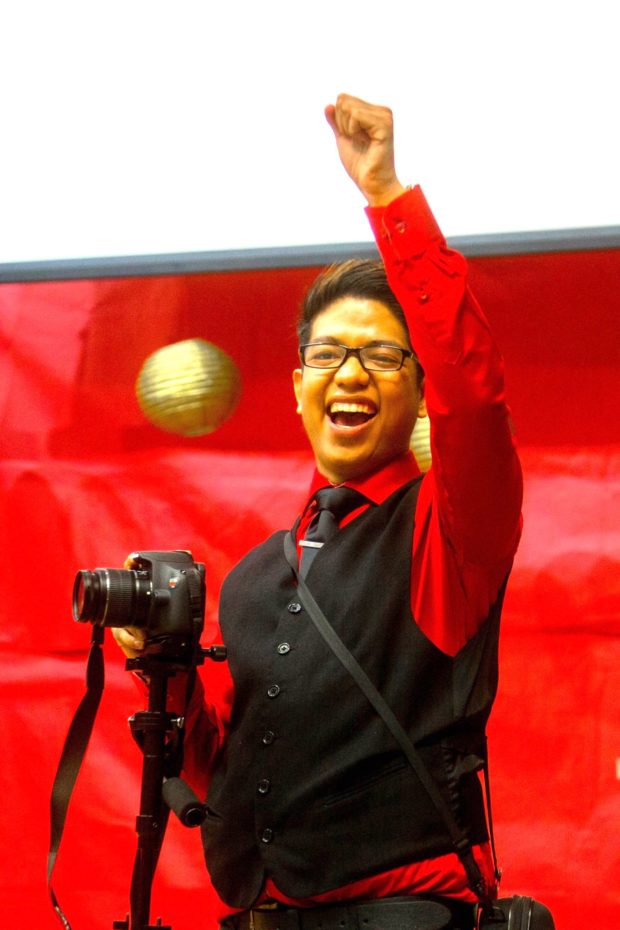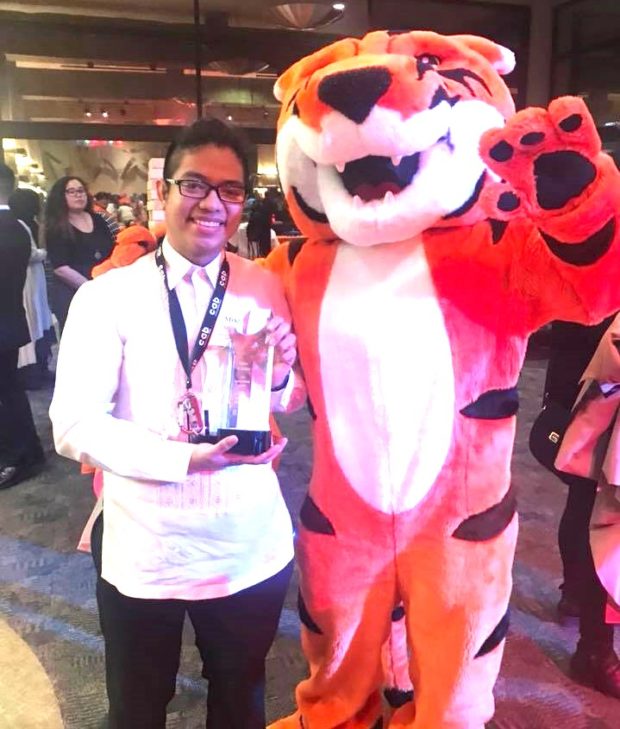Filipino Deaf student thrives in New York school

Deaf scholar Miko Arayata. CONTRIBUTED
He looks like any other ordinary student at Rochester Institute of Technology in Rochester, New York. He greets other students and is quite popular on campus. Meeting his classmates, he smiles, and begins communicating with his hands – he is actually using ASL or American Sign Language.
Meet Miko Arayata, 24 years old, a Person with Disability (PWD), and a Sasakawa-Decaro scholarship grantee at theRochester Institute of Technology/National Technical Institute for the Deaf(RIT/NTID) under the P-CEN Program (Pre-College Education Network) funded by the Nippon Foundation.
Miko is majoring in design and imaging technology specializing in photography and graphic design.
“I don’t feel different because my friends have the same disability like me,” Miko wrote.
Miko is Deaf. Deaf in capital “D,” are people who have been deaf all their lives, or since they started to talk, and Deaf people who affiliate themselves with Deaf culture.
Prior to RIT/NTID, he was a student in School of Deaf Education and Applied Studies (SDEAS)at De La Salle-College of St. Benilde (CSB) in Manila.Since 2003, CSB has been in partnership with the Nippon Foundation and RIT/NTID to improve the education of Deaf students.
Special education in the Philippines
But how is it to be a PWD student in the Philippines, specifically a Deaf student?
The Philippines has 1,443,000 persons with disability or 1.57% of the total population, according to its 2010 Census.
In 1907, the Insular School for the Deaf and Blind was established in Manila. It was also the birth of Special Education (or SPED) in the Philippines. In 1926, the Philippine Association for the Deaf (PAD) was founded.
Equal access and opportunities especially for quality education among PWDs are guaranteed by the 1987 Constitution under Article 14. Thereafter, laws were enacted such RA 5250 for a 10-year training of special education teachers was enacted in 1968; Republic Act No. 7277 Magna Carta for Persons with Disabilities, and its amendment, RA 9442, with prohibitions on Verbal, Non-Verbal Ridicule and Vilification against Persons with Disability.
Despite these, PWD students encounter learning difficulties, especially in public schools without Special Education Centers (Sped).
“I had been struggling with English and Tagalog because the teacher did not teach enough about English grammar, structure, and Tagalog too. I was not satisfied because we did not practice writing in English with specific types and vocabularies. Most of them were projects,” Miko wrote in an email to INQUIRER.net.
Miko also shared that there were not enough resources for the PWDs, specifically for the Deaf students.
Empowering the Deaf
In 1991, SDEAS was established by the College of Saint Benilde to address the growing needs in Deaf education. Its mission is developing leader-advocates who will serve the Deaf community. The school also helps in building an inclusive society by providing employment and business support to the Deaf. The school has Deaf teachers and staff while those who are not Deaf, or are “hearing,” teachers use sign language.

Miko Arayata during the Student Beacon Award for outstanding leadership. CONTRIBUTED
Filipino Sign Language (FSL) is the medium of instruction in which the Filipino Deaf are best able to express themselves and understand. Also, the use of FSL promotes the linguistic identity of the Filipino Deaf community.
According to Giselle Montero, the director for Center for Partnership and Development of SDEAS, about 95% of the students are on scholarships. One of the school’s services to its students and alumni is to find companies who are willing to work with their graduates. The Deaf are employed in the service (hotel and restaurant) sector, graphics, call centers as support staff, as analysts, and in the government.
Getting in at RIT/NTID
When Miko saw the flyers about the scholarship at the SDEAS bulletin board, he had second thoughts because he doubted his capability to pass the series of tests, which are in English.
“I was encouraged by my teacher, Ms. Natividad. My parents also told me to go on,” Miko wrote.
Since Miko started his course in 2015, he has maintained a GPA of 3.8. He graduates this month.
But it had not been not easy.
“I had a hard time understanding my professors and classmates in American Sign Language (ASL). I was also overwhelmed with the RIT system, such as Student Information System (SIS) debit, room, and enrollment,” wrote Miko.
To ease homesickness, he got involved in clubs and does volunteer work. He became the vice president of Asian Deaf Club and served as a student ambassador for Discovering Deaf Worlds (DDW), anon-profit organization that strengthens local capacity in developing countries for the signing Deaf communities.Presently, he is a part-time employee at NTID’s Student Life Team.
Miko won the 2018 Student Beacon Award for his outstanding leadership and ability to balance curricular and extracurricular activities on April 25.
He has become aware of the diversity and identities associated with hearing disability, such as D/deaf, hard-of-hearing, and Deaf Blind. Miko also learned about Signed Exact English (SEE), and Pidgin Sign English (PSE).
Positivity and inspirations
Being Deaf makes Miko work harder to prove that nothing can stop an individual in pursuing a dream. He is inspired by Deaf persons who are successful in their chosen fields, like doctors, photographers, and teachers.
“Despite some setbacks, I am positive. I balance my time between academics and personal life. Also, since I received the scholarship from NTID/RIT, it motivates me to study hard and to keep going until I graduate with the bachelor’s degree,” wrote Miko.
Miko is expected to return to the Philippines after graduation. He plans to establish a new program for graphic design and graphic production courses.
“I want to be a good role model so I can support the Filipino Deaf community and also to show that we (PWD) are not burdens but capable of leadership too,” Miko wrote.
As a commitment to improve the economic condition of the PWDs through employability and entrepreneurship, SDEAS will hold an economic opportunity fair dubbed as PWD Entre-ploment Expo: Bringing together the community to empower PWDs on June 28-29, 2018 at the Henry Sy Hall, DLSU, Taft Avenue, Manila. It is sponsored by De La Salle-College of Saint Benilde (DLS-CSB), through SDEAS and the Saint Brother Jaime Hilario Training Institute (SBJHI), with De La Salle University. It is funded by the United States Embassy in the Philippines.

